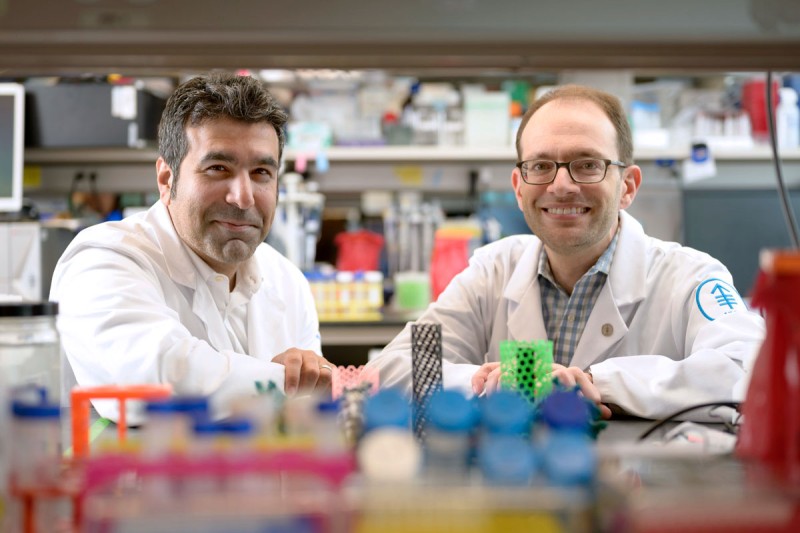
(From left) Dr. Kayvan Keshari and Dr. Daniel Heller are Co-Directors of The Pat and Ian Cook Doctoral Program in Cancer Engineering at MSK.
Memorial Sloan Kettering Cancer Center (MSK) is substantially expanding its commitment to train the next generation of scientists through a first-of-its-kind PhD program that offers researchers with an engineering, physical science, and computational focus the chance to see their laboratory innovations help diagnose and treat cancer.
The Pat and Ian Cook Doctoral Program in Cancer Engineering at MSK will train students to employ engineering techniques to not only make discoveries about cancer but also build tools to improve detection and therapies.
Students training for The Cook PhD in Cancer Engineering will learn to ask and understand the critical questions of cancer biology, develop solutions, and even see their inventions enter clinical use.
“There are many engineers and physical scientists who love making new technologies but would like to go a step further and put them into practice,” says program Co-Director and biomedical engineer Daniel Heller, PhD. “Our program provides them with an opportunity they’ve never had before.”
“We want budding researchers to be aware that this amazing opportunity exists in a way that was not available when Dan and I were starting our careers,” says Co-Director Kayvan Keshari, PhD, a bioengineer and biochemist. “People focused on engineering tend not to have a cancer institution on their radar. Until someone comes here, it’s hard to really appreciate the power of this place. We want them to know they can come here and do truly amazing things.”
Complementing an Elite Cancer Biology Program
Cancer engineering is a discipline that is emerging from major advances in biology and technology. The Cook PhD in Cancer Engineering joins another elite program at the Louis V. Gerstner, Jr. Graduate School of Biomedical Sciences (also known as Gerstner Sloan Kettering, or GSK) — the Cancer Biology PhD Program, which has trained aspiring scientists since 2006. Now these programs in cancer biology and cancer engineering will offer robust training that will produce future cancer discoveries.
“Fundamental knowledge of cancer biology has grown at an incredible pace, accelerated by the development and application of new technologies. Students in this program will continue to propel discovery by addressing key problems in cancer science and will contribute to translating basic science discoveries into clinical advances,” GSK Dean Michael Overholtzer, PhD, says.
Co-Directors Dr. Heller and Dr. Keshari, both at the Sloan Kettering Institute, are passionate instructors who believe this new curriculum has the potential to transform cancer diagnosis and treatment.
Dr. Heller, a former middle-school science teacher, runs a lab that’s on the cutting edge of cancer science technology — using nanotechnology to build sensors to detect cancer and drug delivery systems to treat it. Dr. Keshari is a trained biochemist and engineer who specializes in the use of advanced magnetic resonance imaging approaches to study cancer metabolism. Both are known for being outstanding mentors whose students have gone on to work in academia and the medical industry.
“Cancer biology is mostly an observational field, focused on learning and increasing understanding,” Dr. Keshari says. “Engineering as a field is more about addressing problems and finding solutions. Students in this new program will become adept at identifying good questions because they are embedded in the Cancer Biology Program, but they will be given a tool kit to develop solutions that can be translated.”
Anna-Katerina “Kat” Hadjantonakis, PhD, Chair of the Developmental Biology Program at the Sloan Kettering Institute, says basic biology labs like hers, as well as cancer biology labs, have increasingly relied on engineering techniques in recent years, accelerating demand for these specific skills.
“Classical biology has become much more quantitative, incorporating math and physics, so we are essentially becoming a combination of biologists and engineers,” she says. “Developmental and stem cell biologists are doing engineering types of experiments, seeing and controlling how individual cells change their identity and organize themselves within populations. These are fundamental engineering problems. There’s been a growing need to have an increased emphasis on these nontraditional biological approaches.”
Unparalleled Access to Experts and Resources
Students enrolled in the new engineering program will take an immersive curriculum focused in the first year on the fundamentals of biology (including cancer biology, immunology, and genetics) and on the principles of bioengineering. The first year of training will prepare the students for research in the following years that results in an original contribution to the scientific literature described in a dissertation.
“MSK is developing new technologies in many fields that bridge engineering and cancer science,” Dr. Heller says. “These include cell engineering, drug delivery, and molecular imaging. Our discoveries are enabled by unparalleled access to cutting-edge tools and facilities such as 3D printers, atomic force and light microscopes, whole-body imaging, and genetic engineering resources. We also have extraordinary computational biology resources, such as cBioPortal hosted by the Center for Molecular Oncology, which have enabled unprecedented access to cancer genomics data.”
“It’s something that we really have needed for a long time,” Dr. Hadjantonakis says of the new PhD program. “We’ve had bioengineers in labs across the institution, but there was no formal mechanism for getting engineers together for training, to pool resources, and recruit expertise at the faculty level. So this will really be a game changer.”
“In most institutions, you can develop amazing technologies but never translate your ideas,” Dr. Keshari says. “At MSK, you might actually be able to do something that can change someone’s life.”




